By CHRISTOPHER KAZARIAN – PHOTOGRAPHY BY GEOFF HICKS
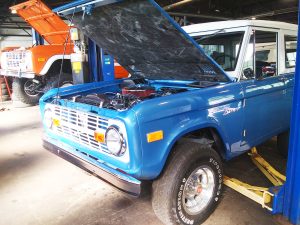 Most people use cars for utility as a way to get to and from work, the store or the restaurant. Others use cars for enjoyment, taking delight in the power, speed and excitement the machines offer.
Most people use cars for utility as a way to get to and from work, the store or the restaurant. Others use cars for enjoyment, taking delight in the power, speed and excitement the machines offer.
Whatever your preference, making sure your car runs—and runs reliably—is of utmost concern. That’s particularly true for owners of everyday older vehicles with lots of mileage on them.
“In our experience, the folks that have a mechanic they trust and go to consistently gives them the best opportunity to keep them on the road,” said Greg Battles, general manager at Battles Auto Center in Falmouth. By contrast, he warned that switching mechanics often can increase the likelihood that cars, especially as they age, break down.
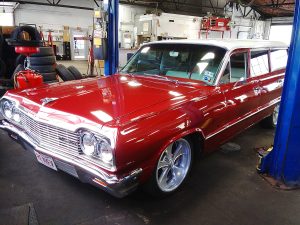 On the most basic level, Battles recommended car owners follow their manual when it comes to scheduling oil changes and replacing brakes, tires and filters.
On the most basic level, Battles recommended car owners follow their manual when it comes to scheduling oil changes and replacing brakes, tires and filters.
Another preventative measure, he suggested, is to protect the undercarriage of the car, noting that “the Cape Cod climate can be tough, especially if you live close to the water or you’re trailering boats or driving on salted roads. That can really accelerate the life of a vehicle.”
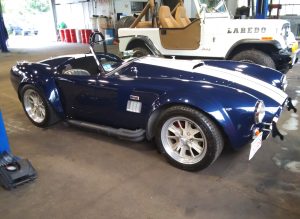 When it comes to insuring older non-classic vehicles, Norah McCormick of McCormick & Sons Insurance Agency in Waquoit said, owners should consider either dropping collision, which isn’t mandatory and covers damage to your car in an accident, or increasing your policy from a $1,000 deductible to a $5,000 deductible as a way to save money.
When it comes to insuring older non-classic vehicles, Norah McCormick of McCormick & Sons Insurance Agency in Waquoit said, owners should consider either dropping collision, which isn’t mandatory and covers damage to your car in an accident, or increasing your policy from a $1,000 deductible to a $5,000 deductible as a way to save money.
“The biggest thing is to have comp [comprehensive] on there at a $1,000 deductible which covers fire, theft, vandalism and also includes your glass,” she said.
With classic cars, she said, owners should determine how often and how they are using their vehicle.
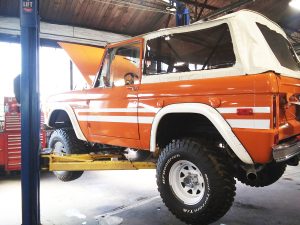 Some opt to purchase an antique policy and getting an antique plate that “limits you to the number of times you can use the car and what you can use it for,” she said.
Some opt to purchase an antique policy and getting an antique plate that “limits you to the number of times you can use the car and what you can use it for,” she said.
With an antique insurance policy, she said, owners need to have their car appraised to determine its value. That value is based not only on the condition it’s in but also on whether it consists of all original parts. An antique policy is also used for vehicles whose owners plan to take it out only a handful of times a year, whether it’s to a car show, a ride along the beach or a downtown cruise during the summer.
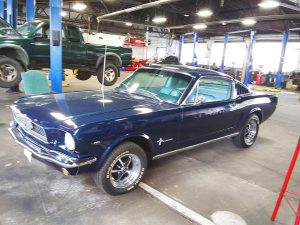 “It’s limited in use because the policy wants to limit the risk,” McCormick explained. “Everything is about risk.”
“It’s limited in use because the policy wants to limit the risk,” McCormick explained. “Everything is about risk.”
If someone plans on driving their vintage car more frequently, she said, they should purchase a regular insurance policy with a regular plate. “You still want an appraisal to substantiate the price of the car,” she said.
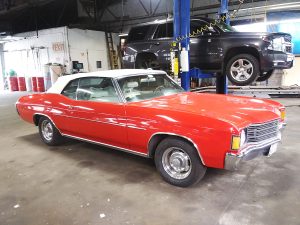 In East Sandwich, Jerry Wojcik drives his two classic cars—a 1963 Pontiac LeMans and a 1974 Triumph TR6—several times a week, from the beginning of April to late November. In the winter, the pair go into the garage, a common practice for owners of classic cars.
In East Sandwich, Jerry Wojcik drives his two classic cars—a 1963 Pontiac LeMans and a 1974 Triumph TR6—several times a week, from the beginning of April to late November. In the winter, the pair go into the garage, a common practice for owners of classic cars.
For Mr. Wojcik, his Pontiac serves as a connection to his past. As a student at Warwick Veterans High School in Rhode Island, he drove a Pontiac LeMans, a vehicle that was designed by John DeLorean and that is considered the precursor to the muscle car. “I owned a classic car before it had become a classic car,” he said of his teenage years.
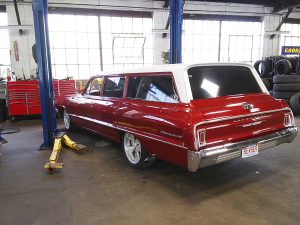 That was in the early 1970s. It would not be until a decade ago that he rekindled his relationship with the LeMans that he purchased in New Jersey. “At the time I was working in Florida and had been interested in getting one, so I was looking all over the country,” he said. “I like the car because I had it in high school and was familiar with it. The thing you have to watch out for when buying an old car is the availability of parts.”
That was in the early 1970s. It would not be until a decade ago that he rekindled his relationship with the LeMans that he purchased in New Jersey. “At the time I was working in Florida and had been interested in getting one, so I was looking all over the country,” he said. “I like the car because I had it in high school and was familiar with it. The thing you have to watch out for when buying an old car is the availability of parts.”
With the LeMans, he said, parts are hard to come by.
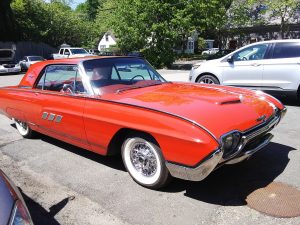 With the Triumph, which is a British car, “getting parts is not an issue,” he said. He purchased that one about five years ago.
With the Triumph, which is a British car, “getting parts is not an issue,” he said. He purchased that one about five years ago.
Being a retired structural engineer, Mr. Wojcik’s hobby keeps him busy. He does much of the work on his two cars himself, which is one suggestion he had for someone thinking about purchasing a classic vehicle. “Unless you’ve got a lot of money, you have to be handy and do some of the work yourself,” he said. “All of them are 30 years older or more, and they require a lot of maintenance to them.”
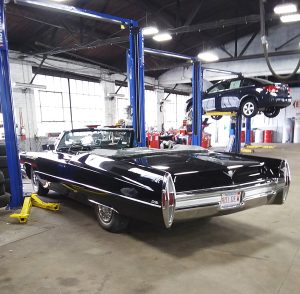 Still, there are some projects he has turned over to the professionals, like when he had the engine to his LeMans rebuilt seven years ago.
Still, there are some projects he has turned over to the professionals, like when he had the engine to his LeMans rebuilt seven years ago.
And if you’re not handy? Become a member of the Cape Cod Classic Car Club or the Cape Cod British Car Club. Yes, Mr. Wojcik belongs to both.
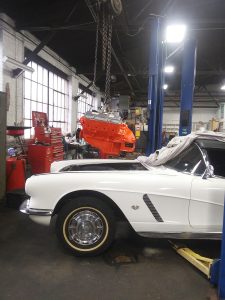 “If you’re local, the best thing for you to do is join a club where people have experience with different shops and can recommend where you should go,” he said. “It is worth it.”
“If you’re local, the best thing for you to do is join a club where people have experience with different shops and can recommend where you should go,” he said. “It is worth it.”
Certain automobile brands have larger organizations—he also belongs to the Pontiac-Oakland Club International—that are also worth joining, especially because they can provide another layer of technical expertise to questions pertaining to specific cars.
As to which car he prefers to drive, Mr. Wojcik was noncommittal. “I like the LeMans because it is a peppy car and fun to drive,” he said. “I put seat belts in it all around so I can even take my grandkids in it.”
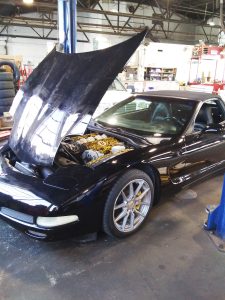 While the TR6 “doesn’t have the big horsepower like the Lemans, it is fun to drive,” he said. “Of course, it’s a two-seater, so you can’t put a lot of people in it.”
While the TR6 “doesn’t have the big horsepower like the Lemans, it is fun to drive,” he said. “Of course, it’s a two-seater, so you can’t put a lot of people in it.”
Mr. Wojcik and his wife, Ellen, also own a 2011 Nissan Titan and a 2012 Nissan Versa. His decision to add not one but two classic cars to the mix is based on one of life’s simple facts. “You know things always go wrong when you least expect them to,” he said. “With two cars, I can have at least one I drive while I’m working on the other.”
For those who may not have the skills he does, there are local mechanics who specialize in working on vintage cars. At Battles, it’s technician Geoff Hicks’s preference.
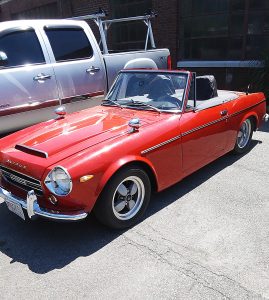 In the past, he has owned a ‘69 Mustang 428, ‘65 Mustang and ‘69 Chevrolet Impala. “I like being able to work on them,” he said of classic cars. “Personally, I prefer to build them. It’s not about actually buying a car for me, but being able to build one and saying this is what I built.”
In the past, he has owned a ‘69 Mustang 428, ‘65 Mustang and ‘69 Chevrolet Impala. “I like being able to work on them,” he said of classic cars. “Personally, I prefer to build them. It’s not about actually buying a car for me, but being able to build one and saying this is what I built.”
While he no longer owns vintage cars, he still gets the thrill of fixing them at his day job. Compared to newer cars, he said, the classics are simpler while still presenting a challenge. “There’s a little detective work when working on an older car and figuring out what’s causing the issue,” he said. “There’s a lot of intrigue and a lot more nuts and bolts to them. I like that part more than the electronic parts of cars these days.”
So what’s the best way to find a good mechanic to work on your classic car? “Word of mouth,” he said.
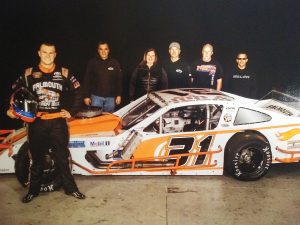 Because of his longevity in the business—Mr. Hicks has been a mechanic for more than 50 years—and his knowledge and passion for fixing cars, word of mouth often leads customers to him. It’s work he still enjoys.
Because of his longevity in the business—Mr. Hicks has been a mechanic for more than 50 years—and his knowledge and passion for fixing cars, word of mouth often leads customers to him. It’s work he still enjoys.
“There is a lot of instant gratification in helping people who come in with their car and have a problem with it,” he said. “You get to play detective. You find the problem and fix the problem. There is a lot of satisfaction in that.”

